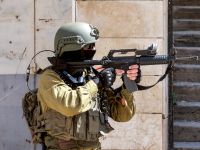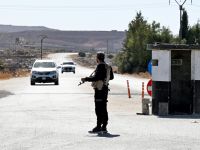A large number of Israeli armored corps, engineering corps and infantry took control of Palestinian Authority Chairman Yasser Arafat's office building in his compound in the West Bank city of Ramallah on Friday evening, PA sources said.
The three-story building was plunged into darkness when Israeli troops cut off electricity and destroyed a generator Friday night. The phone lines were blocked, leaving Arafat with a cell phone as his only connection to the outside world.
Israeli troops first stormed the compound Friday morning, and by the afternoon had taken control of most of the buildings in the complex.
An Israeli spokesman said that the troops carried out a room-to-room search of the compound and arrested at least 70 people.
Two Israeli soldiers were killed during an exchange of fire with Palestinians in Ramallah. Five soldiers were also wounded.
Palestinian sources said that Israeli troops blasted a hole in the wall of the compound before entering. Seven Palestinians were killed, among them at least two civilians, and 50 were injured during the operation, Palestinian sources said.
Israeli bulldozers, assisted by tanks, demolished three PA buildings north of Arafat's office.
Palestinian television broadcast that Israeli troops had taken over intelligence and security buildings in the compound. The troops also seized control of the prison holding the suspects in the assassination of Israeli cabinet minister Rehavam Ze'evi last October.
U.S.
U.S. Secretary of State Colin Powell said Friday that Israel promised it will not harm Arafat during its assault on his compound in the West Bank, but wants to isolate him.
According to AP, Powell said he spoke to Israeli Prime Minister Ariel Sharon as Sharon's cabinet was deciding how to retaliate for a series of deadly Palestinian suicide attacks against Israel.
"He advised me it would not include bringing any harm to Chairman Arafat, or killing him," Powell said.
The secretary of state condemned the recent string of attacks that have killed Israeli civilians, and called on Arafat to do more to end them. He said the attacks have destroyed the "guarded optimism" U.S. officials had felt about resuming the peace process.
"Let's be clear about what brought it all to a halt — terrorism. Terrorism that would target those who are innocent civilians," Powell said. But he also called on Sharon to use restraint in Israeli reprisals.
"While we understand the Israeli government need to respond to these acts of terror and the right of the Israeli government to decide what actions best serve the interests of the Israeli people, we call on Prime Minister Sharon and his government to carefully consider the consequences of those actions," Powell said.
He added that the Palestinian leader has a vital role to play in ending the cycle of violence. "Chairman Arafat is the leader of the Palestinian people, and his leadership is now even more central to trying to find a way out of this tragic situation," Powell said.
President Bush talked Friday with his top national security advisers, including Powell, Defense Secretary Donald H. Rumsfeld, national security adviser Condoleezza Rice and CIA Director George Tenet. Bush planned no calls to leaders in the region Friday, a spokesman said.
The decision was made to keep U.S. envoy Anthony Zinni in the Mideast region to continue to talk with both Palestinians and Israelis, Powell said. Zinni spoke to Arafat on Friday.
Zinni, who has been trying for two weeks to broker a ceasefire, had no immediate comment, but a US official said he had scheduled separate meetings with both sides.
"His mission continues, he has no plans to leave," the official said.
Powell said he would reach out Friday to Arafat by telephone to discuss the situation. As he has before, Powell made clear that the United States believes Arafat needs to do more to try to stop attacks on Israel.
"We have spoken out clearly and do so again now, for Chairman Arafat to act against those responsible for these acts, and to make clear to the Palestinian people that terror and violence must halt now," Powell said at a briefing at the State Department. Powell called on Arab and European nations to deliver that message, as well.
The United States understands Israel's need to respond to the acts of violence, Powell said. But at the same time he called on Sharon and his government, as they launch military reprisals, to "carefully consider the consequences of those actions."
Powell said the Israelis have assured him they do not intend to occupy the Arab areas in the West Bank and Gaza "for some extended period. They are going in to find the terrorists, to pick up weapons," he said.
For his part, Arafat, in a TV interview by telephone, said Israel could not have launched its offensive without Washington's approval. "The entire world should be aware that Israel does not, and can not, act without American consent," he said.
More Reactions
Lebanon, as chair of the just-concluded Arab summit, strongly condemned the Israeli action in Ramallah and urged the United States, United Nations, Russia and the European Union (EU) to intervene.
"Only hours after the Arab peace initiative was adopted at the Beirut summit, Israel responded with a barbarous war and an arrogant savage aggression", the Lebanese foreign ministry said in a statement.
"The presidency of the Arab summit denounces in the strongest manner this arrogant aggression," the statement said. It urged "all those who back the Arab peace initiative to act immediately to deter Israel and its aggression."
According to AFP, Iran called the incursion a "new act of Israeli state terrorism" and demonstrations in support of Arafat were held in Egypt, Jordan and the United Arab Emirates as well as on the Gaza Strip.
Russian Foreign Minister Igor Ivanov expressed "extreme concern" over the spiraling bloodshed. "We consider that the policy of isolating Arafat is not the way to find a way out of this situation. We think that through dialogue ... we should look for a political solution to this crisis," he added.
French Foreign Minister Hubert Vedrine said he understood Israel's anger but told French radio that "it is not by asphyxiating Arafat that a solution will be found."
France, Switzerland, Belgium and Austria all called on Israel not to harm Arafat. Germany called on both sides to pull back from the brink and return to the negotiating table.
EU foreign policy chief Javier Solana spoke with both Israeli Foreign Minister Shimon Peres and Arafat. "We are not going to resolve the Palestinian conflict by military action," an EU spokeswoman said.
The various Islamic and nationalist Palestinian factions met Friday and decided to "unite to defend the Palestinian people," an official of Hamas told AFP.
The meeting was held by the National and Islamic forces, an umbrella group of 13 Palestinian factions including the movements Islamic Jihad and Hamas, which claimed responsibility for Wednesday's blast in the city of Netanya.
Hamas warned the Jewish state it would "pay a high price for its aggression in Ramallah" while the Popular Front for the Liberation of Palestine threatened to hit "every Israeli" the world over. (Albawaba.com)
© 2002 Al Bawaba (www.albawaba.com)







